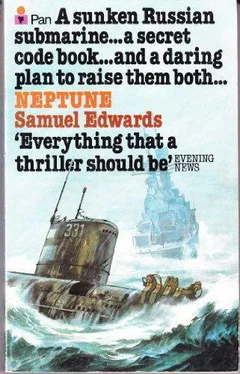Samuel Edwards - Neptune
Здесь есть возможность читать онлайн «Samuel Edwards - Neptune» весь текст электронной книги совершенно бесплатно (целиком полную версию без сокращений). В некоторых случаях можно слушать аудио, скачать через торрент в формате fb2 и присутствует краткое содержание. Город: London, Год выпуска: 1978, ISBN: 1978, Издательство: Pan Books, Жанр: Шпионский детектив, Триллер, на английском языке. Описание произведения, (предисловие) а так же отзывы посетителей доступны на портале библиотеки ЛибКат.
- Название:Neptune
- Автор:
- Издательство:Pan Books
- Жанр:
- Год:1978
- Город:London
- ISBN:0-330-25006-X
- Рейтинг книги:4 / 5. Голосов: 1
-
Избранное:Добавить в избранное
- Отзывы:
-
Ваша оценка:
- 80
- 1
- 2
- 3
- 4
- 5
Neptune: краткое содержание, описание и аннотация
Предлагаем к чтению аннотацию, описание, краткое содержание или предисловие (зависит от того, что написал сам автор книги «Neptune»). Если вы не нашли необходимую информацию о книге — напишите в комментариях, мы постараемся отыскать её.
The Russian atomic submarine ZOLOTO lies crippled and abandoned on the bed of the South China Sea. The secrets entombed inside are vital to both east and west. A custom-built super-dredger NEPTUNE assembled under maximum secrecy and plagued by agents of Soviet Russia and Red China, is bound on a clandestine salvage operation to capture the prize that could mean nothing less than world domination…
Neptune — читать онлайн бесплатно полную книгу (весь текст) целиком
Ниже представлен текст книги, разбитый по страницам. Система сохранения места последней прочитанной страницы, позволяет с удобством читать онлайн бесплатно книгу «Neptune», без необходимости каждый раз заново искать на чём Вы остановились. Поставьте закладку, и сможете в любой момент перейти на страницу, на которой закончили чтение.
Интервал:
Закладка:
He and Adrienne could buy a little villa for only a fraction of the loot. In the mountains behind the French Riviera, perhaps, or on the west coast of Florida. He had no way of knowing whether the idea would appeal to her, or whether she’d accept, but he’d lose nothing by asking. At least he wouldn’t have to propose marriage – or would he? Adrienne was as tough and resilient as they came, but even a totally liberated woman might be inclined to balk at too informal a partnership.
The mere contemplation of such a wild scheme was absurd, Porter told himself. But it did keep his mind off the hazards that awaited him in Singapore, and he wished he hadn’t dreamed up this caper. He tried to comfort himself with the thought that it was going smoothly, perhaps a little too smoothly for his peace of mind.
Perhaps it was the inaction of the moment that was weighing him down and making him itchy. One of his favourite theories was that a field agent was at his most vulnerable when he sat on his arse and tried to use his mind. He’d been sitting for so long that the pattern of the Russian upholstery of his seat was permanently imprinted on his rear.
He unbuckled his seat belt, stretched and walked forward to the bathroom, aware of the intent scrutiny of the KGB stewardess. He could imagine the orders Andropov had given the crew: ‘Don’t let the man or the girl out of your sight, and permit them to communicate with no one. Make just one mistake and you’ll spend the rest of your shortened life in a Siberian labour camp.’
Emerging from the bathroom, Porter came face to face with the burly steward, who was just leaving the cockpit. ‘What’s the good word, Comrade? Are we holding to our schedule?’
‘Of course,’ the man said. ‘But there are minor complications that could be avoided.’
Porter felt a twinge of apprehension, but continued to smile. ‘What sort of complication?’
‘Our representative who has been assigned to hold a rendezvous with you has been delayed.’
‘Why is that?’
The steward became contemptuous. ‘Perhaps the Corporation reveals such things in wireless messages, even when they are coded. But we do not. The pilot’s instructions made no mention of the cause of the delay.’
‘Fair enough.’ Porter shrugged, as though such things were of no consequence to him.
‘Therefore we will not fly direct to Singapore. We will make an intermediary landing and await orders to proceed.’
‘Sounds great,’ Porter said. ‘Any idea where we’re going instead of Singapore?’
The man’s eyelids blinked twice. ‘I will inquire of the captain whether I am permitted to tell you, but I already know the answer. I saw the wireless message myself, and there was no mention in it of telling the passengers our temporary destination.’
The KGB, Porter had to concede as hi returned to his seat, played their cards very close to their collective chest.
Now he had a real cause for worry. Had the KGB discovered his ruse? If so, a bullet would find its way into the back of his head soon after they landed. Unless Moscow still hadn’t learned the reason for his deception, and Moscow was inclined to be exceptionally curious, so they would sweat the truth out of him. He’d hold out, of course, but he didn’t know how long he could manage these days. Every experience with a torturer made a man break down faster the next time because his imagination worked overtime and he knew what was coming. Porter was afraid he lacked the stoicism of the Deacon, but knew this was not the opportune moment to change professions.
Nancy was awake when he returned to his seat, and he held his breath as he bent down to kiss her. A small gesture of consideration was the least he could make for her, since she, too, well might be called upon to pay with her life for his sins.
The breadth of the Pacific Ocean was deceptive. People who flew from California to the Orient over the world’s largest sea in a day and a half often were unaware of its size, but it was impossible to fool those who sailed her surface, even in a ship that maintained speeds equal to those of the Queen Elizabeth II.
The monotony of the voyage was partly responsible. The Neptune ploughed steadily westward through tranquil seas, the sky overhead a bright blue, the sun warm and the winds gentle. Only the roar of US Air Force jets, repeated hourly, was a reminder that this was no ordinary cruise.
Members of the crew appreciated the calm and the weather, but the civilian members of the expedition were too busy to notice. Every morning after an early breakfast they assembled in the Operations Centre, and there, for the next ten hours, they rehearsed the roles they would play when the attempt was made to raise the Zoloto from its resting place more than three miles beneath the surface of the South China Sea.
Each morning Adrienne Howard stopped in to watch for a time, and was struck by the quiet of the session. Nearly one hundred men and about twenty women were gathered in the saloon, and all were intent on their own work. There was no unnecessary conversation, no jokes were exchanged and each participant concentrated exclusively on his assigned task. These people were experts in undersea salvage, sonar and computer operations, and none needed instructions.
The majority wore earphones, plugged into a console resembling an electric organ that sat on a dais at one end of the huge cabin. Seated before it and resembling a schoolmaster supervising a class was Franklin Richards, and on either side of him was a computer readout specialist who kept watch on scores of dials and, under his supervision, co-ordinated the activities of the others. Occasionally he punched a switchboard button and spoke a few words through a microphone to one of the experts, but his pace was always unhurried and he never raised his voice. Not even Sir Thomas Beecham conducting a symphony rehearsal had ever appeared more tranquil, more in control of himself.
Only the observers who manned the underwater television sets would have nothing to contribute until the Neptune reached her target area. They amused themselves by watching marine life, and played a game in which they gave themselves points that depended on the nature of the species they spotted. Barracuda, tuna, and sailfish kept their interest alive, but one afternoon they saw a school of grey-fin sharks, and were so fascinated by the ugly creatures that thereafter they could not duplicate the excitement they had felt earlier.
The complexities of the functions performed by the computers was astonishing. Gyroscopes first built for undersea use in atomic-powered submarines and adapted for surface use revealed the precise location of the Neptune from one split second to the next, and a recently perfected sonar device attached to a small computer of its own instantly calculated the distance from the underside of the Neptune’s hull to any underwater object located up to six and five-sixteenths miles from the vessel. The device was accurate to an amazing degree, and was never more than three millimetres off target.
The salvage operators rehearsed their jobs endlessly, repeating them under the direction of a smiling but alert Franklin Richards until every move, every gesture was done automatically and without hesitation. In effect these experts were scientific assembly line workers, and the ultimate success or failure of Project Neptune would depend on their ability to work swiftly and surely, never pausing to wonder if they had erred.
Meanwhile, on the bridge, Captain Humphries kept his own vigil. Out of sight of the Neptune but visible on her radarscopes were her escorts: a heavy cruiser to port side, a light cruiser to starboard and an aircraft carrier trailing behind her. Had a hostile aeroplane managed to penetrate her defence perimeters its observers would not have guessed that the four ships were sailing in concert, that the slightest change in the Neptune’s course was reflected without delay in the changes made by the warships.
Читать дальшеИнтервал:
Закладка:
Похожие книги на «Neptune»
Представляем Вашему вниманию похожие книги на «Neptune» списком для выбора. Мы отобрали схожую по названию и смыслу литературу в надежде предоставить читателям больше вариантов отыскать новые, интересные, ещё непрочитанные произведения.
Обсуждение, отзывы о книге «Neptune» и просто собственные мнения читателей. Оставьте ваши комментарии, напишите, что Вы думаете о произведении, его смысле или главных героях. Укажите что конкретно понравилось, а что нет, и почему Вы так считаете.












